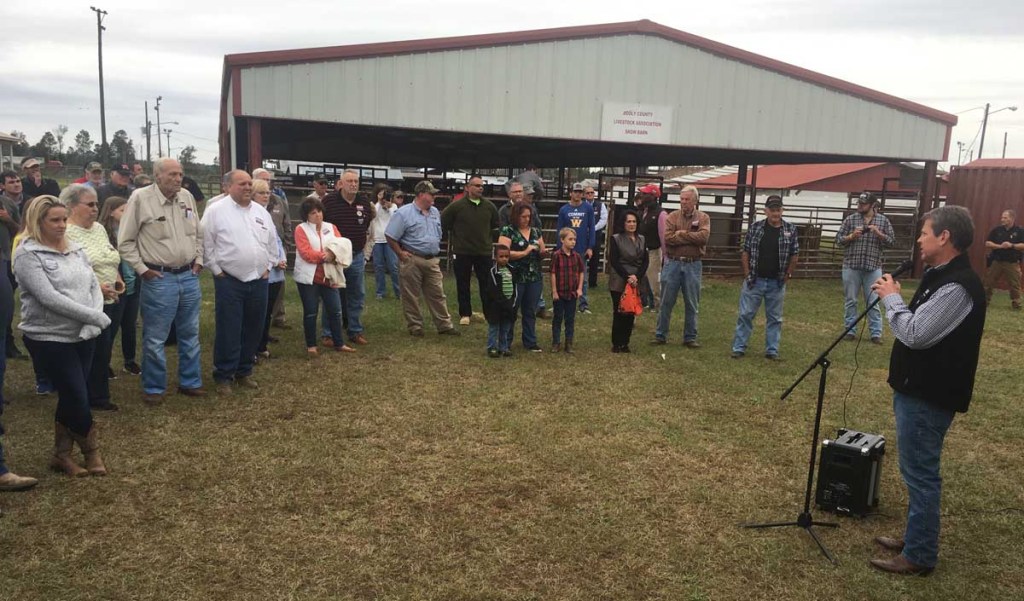Abrams, Kemp stump for rural votes
Published 4:24 pm Friday, October 26, 2018

- Brian Kemp, the Republican candidate for governor in Georgia, speaks at a campaign stop at the Dooly County Livestock Association in Vienna. "I appreciate people that farm and work in hospitality. I think that is a noble profession," Kemp said, referring to comments made by his opponent Stacey Abrams.
HAWKINSVILLE, Ga. – From the beginning, the two candidates vying to be Georgia’s next governor have been on the hunt for votes in rural Georgia. Their approaches, though, could not be more different.
Stacey Abrams, an Atlanta tax attorney, has brought her fiery speeches to ruby red counties trying to inspire likeminded voters in areas often written off by Democrats. Brian Kemp, a cowboy-boot-wearing Athens businessman, has traveled the state shaking hands with rural conservatives he is urging to show up in force.
But while Abrams has hit the road raising alarms over voter suppression and urging people to cast a ballot early, Kemp – who, as secretary of state, is the state’s top election official – has capitalized on Abrams’ rural Georgia gaffes as a way to rile up his own supporters.
“We’ve been looking, but we’ve yet to find Glasgow County,” Kemp said to laughs from a crowd assembled outside M&T Meats in Pulaski County on Thursday afternoon. He was referring to a non-existent county Abrams recently named while being interviewed on Meet the Press.
“But we know right here in Hawkinsville, we are in the home of a lot of great farmers and a lot of great ag producers and many other hard-working Georgians,” he said. “And I have great appreciation for that because I’m one of you.
“And for my opponent to say that people shouldn’t have to go into agriculture and hospitality is wrong,” he said.
Kemp is referring to a comment Abrams, a former House minority leader, made during a stump speech at Georgia Southern University that her critics say belittled the state’s top industry and the backbone of many rural economies in Georgia: agriculture.
Here’s what Abrams said: “I want to create a lot of different jobs. Because people shouldn’t have to go into agriculture or hospitality in Georgia to make a living in Georgia. Why not create renewable energy jobs? Because, I’m going to tell y’all a secret: Climate change is real.”
House Speaker David Ralston, a Republican from rural north Georgia who backs Kemp, said the comment was one of the most jarring he’s heard in what has become a bitterly fought race.
“That comment was so offensive on so many levels and shows a complete disconnect from what Georgians are thinking and what they’re proud of,” Ralston said in an interview Tuesday.
The Abrams campaign has said the comment, made more than a week ago, was taken out of context and has fired back at Kemp.
“This is an absurdly misleading attack from someone who has plans to kill Georgia’s hospitality industry by signing discriminatory legislation like RFRA,” said Abigail Collazo, an Abrams spokeswoman, in a statement referring to religious freedom legislation that opponents say would encourage discrimination against same-sex couples.
“And while Stacey Abrams believes all Georgians – including farmers and hospitality workers – should have access to affordable health care, Brian Kemp has continued to staunchly oppose Medicaid expansion,” she added.
Abrams has worked to rally the support of far-flung Georgians with a call to expand the state’s insurance program for the poor and disabled. It’s a move she says will stabilize rural health care and create tens of thousands of jobs in communities outside the thriving Atlanta economy. She also proposes a $10 million fund for small business loans.
Kemp says he favors expanding a different program that offers a 100 percent tax credit for donors who give money to rural hospitals. He also says he would form an economic development strike team whose daily focus would be to work with rural areas thirsty for jobs. To him, strengthening local tax bases is a step toward aiding the state’s fragile rural hospitals.
They have both pledged to renew a push under the Gold Dome to bring high-speed internet to areas that lack it.
Both campaigns have found enthusiastic support in towns hundreds of miles away from vote-rich Atlanta, and early voter turnout is up across the state. As of Thursday, more than 944,000 ballots had already been cast.
Polls show the pair locked in a dead heat, with a runoff possible. If Abrams wins, she will become the first black female governor in the country.
But some say Abrams’ comment – and Kemp’s efforts to amplify it – has taken hold in parts of southwest Georgia, where Abrams has visited cities such as Thomasville and Albany – where she launched her campaign – numerous times.
Kemp just wrapped up a three-day swing through rural Georgia, including places where large pecan trees toppled by Hurricane Michael serve as painful reminders of the storm’s merciless wrath.
“I think the biggest problem with it is it’s come on the heels of Michael, and farmers are devastated and hurting,” said Laura Register, a Democrat who serves on the Grady County Board of Education. Register backed Abrams’ opponent in the primary but says she will vote for Abrams.
But Jewell Howard, a retired educator in Mitchell County, which is one of the top agricultural counties in the state, dismissed the backlash as politics as usual.
“I think it all depends on whose lens you’re looking through,” said Jewell, who also chairs the county’s Democratic Party.
“Agriculture hires a lot of people and there’s nothing wrong with working in agriculture,” he added. “But down here in southwest Georgia, we need to have a variety of industry so that people who choose another profession will be able to make a living doing something else also.”



